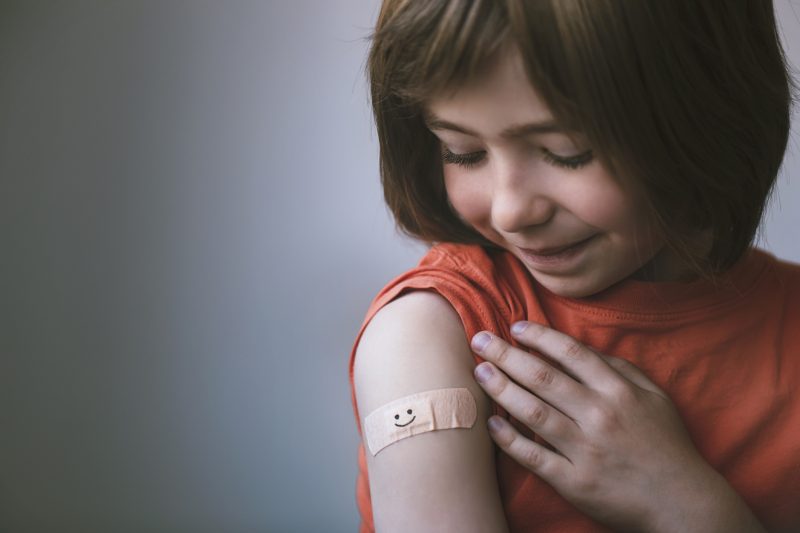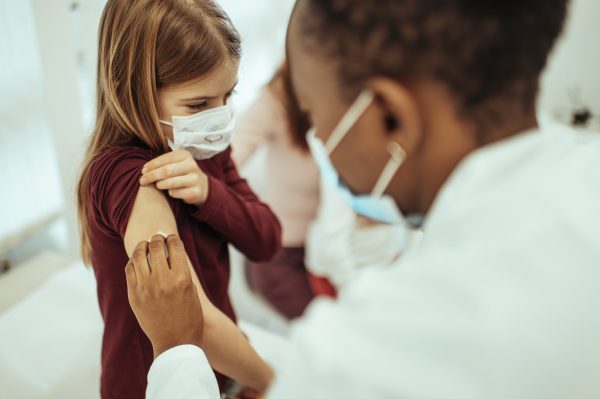 Are you wondering if your child should receive the newly approved COVID-19 vaccine? As children ages 5 to 11 are now eligible to receive it, we want parents to have all the information they need.
Are you wondering if your child should receive the newly approved COVID-19 vaccine? As children ages 5 to 11 are now eligible to receive it, we want parents to have all the information they need.
Critical care physicians Drs. Michael Bigham and Michael Forbes, and infectious disease physician Dr. Eric Robinette recently participated in a panel discussion to respond to COVID-19 vaccine questions and concerns from parents in hopes of building confidence around the vaccine and bending the curve of infections.
Dr. Bigham: What is the dose of the newly approved vaccine for kids ages 5 to 11?
Dr. Robinette: The Pfizer vaccine is the only one approved for use in children under 18 years of age, and it is that same Pfizer vaccine that’s been approved for use in children 5 to 11 years of age. However, it is a different dose; it’s one-third of the dose for children aged 5 to 11, compared to what we’re giving kids aged 12 and above. When studying the vaccine for younger children, scientists tested several different doses and they picked the one that produced the best immunity with the least side effects. Other than that, it’s essentially the same vaccine.
Dr. Michael Bigham: Parents are wondering if weight or height of a child affect which dose they should get, or is it really based on age? For example, what if a child is a really tall kid for age 11, while another is a petite, thin 12 year old?
Dr. Robinette: It’s strictly based on age, so your children should get the dose that is recommended for their age at the time of the vaccine.
It’s pretty cool how scientists studied this. We know that 30 micrograms, that’s the 12 and older dose, works. We know it’s safe. But, they tested 3 different doses at the beginning of the trial for 5 to 11 year olds: 10, 20 and 30 micrograms.
Scientists found that the 30-microgram dose left patients with more reactions right after the vaccine. They were mild side effects, such as fever and just feeling under the weather. But, they decided to look at the 20- and 10-microgram doses. They found the 20-microgram dose caused a little less reaction than the 30-microgram dose, and the 10-microgram dose was even less reaction than the 20, which is a very powerful finding in science. When you see that as the dose goes down, the reactions go down, or as the dose goes up, the reactions go up, that’s very useful information.
They also looked at the antibody responses in the 20- and 10-microgram doses, and they saw that the antibody responses were exactly the same in both groups. So, scientists felt the 10-microgram dose for children under 12 would give them the least side effects with an excellent antibody response.
Dr. Bigham: Is the Pfizer vaccine a 2-dose series?
Dr. Robinette: Yes. Just like what we’re doing for kids aged 12 and up, it’s a 2-dose vaccine series that is given 21 days apart.

Pictured left to right: Akron Children’s critical care physicians Drs. Michael Bigham and Michael Forbes, and infectious disease physician Dr. Eric Robinette
Dr. Bigham: What are the consequences of a COVID-19 infection in kids?
Dr. Forbes: What we saw in the early days with the original Alpha variant of COVID-19 was a fair amount of what we call Multisystem Inflammatory Syndrome in Children, or MIS-C, where during or after the infection organ systems can become inflamed and make the child critically ill. Now, in this vaccine era, we’re seeing that really none of our MIS-C patients have been vaccinated. So, it appears that being unvaccinated may also increase your child’s risk for MIS-C.
Dr. Bigham: I think it’s important to note, too, that the data based on our own local experience at Akron Children’s shows we’ve not yet had a single patient admitted to the hospital with COVID-19 or the MIS-C complication who has been fully vaccinated. I do think that validates our experience that there does seem to be a consistent pattern of prevention of hospitalization and MIS-C for those kids who are vaccinated.
Dr. Bigham: We’ve already discussed the benefit of preventing hospitalization, but what are the benefits of the COVID-19 vaccine for young kids versus the risks of side effects, especially myocarditis?
Dr. Robinette: Sure, that’s the important question when deciding whether to authorize a vaccine. If you think about it like a teeter-totter, we’re weighing the vaccine benefits on one side and weighing the vaccine’s potential risks on the other side to see which side weighs more. Is it more risk or more benefit?
There is a rare complication from the mRNA-based vaccines, which includes the Pfizer vaccine that we’re talking about, called myocarditis. It is an inflammation of the heart muscle. It appears to be more common in males and people under the age of 24. So, the question is because children are at decreased risk of serious COVID-19 illness compared to older adults, especially the elderly, is it still justified to give the vaccine with this possibility of myocarditis?
The answer that we have for the 12 and older age group is very clearly yes. The risks of myocarditis, although real, are extremely rare, and the risks of COVID-19 are several to a hundred times more frequent than the risk of myocarditis.
Dr. Bigham: So, is the vaccine justified for kids 5 to 11 years with the possibility of myocarditis?
Dr. Robinette: The study for this age group involved about 3,000 patients who received the vaccine and about 1,500 patients who got a placebo for comparison to the vaccine group, and none of the vaccine patients had an episode of myocarditis. So, it’s certainly similar to what we’ve seen in the 12 to 18 year olds. It appears to be a quite rare side effect.
If we assume that the rate of myocarditis in this younger age group is the same as it is in the highest risk age group, boys ages 16 to 18, we would still find that the risk of COVID-19 is higher than the risk of myocarditis under almost every plausible condition that we analyze.
Additionally, it’s important to note that COVID-19 itself causes myocarditis at a fairly high rate. MIS-C, which Dr. Forbes talked about, causes myocarditis at a fairly high rate, and the long-term outcomes for myocarditis caused by a COVID-19 infection is significantly worse than the prognosis for the myocarditis caused by the vaccine. So even in those unfortunate rare patients who do get vaccine myocarditis, it is significantly less dangerous than that caused by COVID-19 infection.
So the overall risk benefit, even in spite of this rare side effect, appears to be strongly in favor of the vaccine being the safer of the 2 options.

Even in spite of the rare side effect, myocarditis, the risk benefit is strongly in favor of the vaccine being the safer option than your child getting a natural COVID-19 infection.
Dr. Bigham: Is there any risk of getting the COVID-19 and flu vaccines at the same time?
Dr. Robinette: The short answer is the CDC (Centers for Disease Control and Prevention) say it’s perfectly fine to give both of those vaccines together, and really any combination of vaccines that a patient needs along with the COVID-19 vaccine.
The longer answer is there are really two things that you have to think about when you’re giving two vaccines at the same time: Does giving both vaccines increase the person’s risk of side effects? And, do the vaccines still work?
The reality is it’s extremely rare for two vaccines together to be more dangerous than those vaccines given separately. It’s also extremely rare for two vaccines to interfere with each other.
We now have excellent data for the first question. We have hundreds of thousands of people in the 12 and up age groups who have received combinations of any number of different vaccines along with the COVID-19 vaccine, and there’s been no evidence of increased risk of adverse effects from that combination. So, there’s no reason to believe it would be any different in the 5 to 11 age group.
We have less data on the effectiveness of the vaccine when given together, but based on what we understand about how these vaccines work and how vaccines work in general, there’s not much plausible evidence to suggest that they would interfere with each other.
Dr. Bigham: I’m hearing about the risk of the vaccine weakening a child’s immune system and perhaps, the natural infection is better for a child’s immune system than the vaccine. Is this true?
Dr. Robinette: The human immune system is amazing at protecting us from illness. The ultimate, most protective response is when the immune system can remember an infection. That’s called lifelong immunity and it’s typically performed by memory antibodies.
The magic of the COVID-19 vaccine is it causes your body to produce the same, very specific antibodies you would get with a natural COVID-19 infection without the risks that come with it.
The natural COVID-19 infection is dangerous. But if you do well, which many people do, you have pretty good protection against reinfection. Similarly, the vaccine is less dangerous than the natural infection, and it produces the same protection. We don’t, however, have great data yet to know if one is better than the other. They’re both very good.
The bottom line is vaccines are a safe way to produce immunity to infections, including COVID-19. We can get protected without exposing ourselves to those risks.
Dr. Bigham: Based on what you know and your experience with COVID-19 patients at the hospital, if you had children 5 to 11 years of age, would you get them vaccinated?
Dr. Forbes: Wow, that’s a great question. The short answer is yes because we’ve had lots of experience with this, and the science around vaccinating patients who are 12 and above is extremely strong. We’ve given literally billions of doses with very few adverse events and lots and lots of protection with many lives saved. I think the experience we’ve had this year with unvaccinated people filling our Intensive Care Units, backing up our emergency departments, and the loss of life and disability, is very compelling that the vaccine has made a huge difference.
The approach the FDA (U.S. Food and Drug Administration), CDC and scientists have taken for 5 to 11 year olds gives me terrific confidence: a lower dose, a lengthy enough study to look for anything that could possibly occur, all with a terrific safety profile. And, honestly, we have a long history of developing vaccines that prevent hospitalization and death, to the benefit of community health.
Dr. Robinette: If I had a child aged 5 to 11, I would vaccinate, too, for the same reasons as Dr. Forbes mentioned.
I feel very confident the scientific community has done everything it can, every step of the way to minimize risk to patients. I also feel very confident, based on what I’ve seen over the past year, how careful the CDC and the FDA have been about following adults for adverse reactions we weren’t aware of during the clinical trials. So, if there are rare side effects in 5 to 11 year olds, we will detect them and find them appropriately, as well.
Dr. Bigham: To that point, I do remember the FDA and CDC were holding the bar so high that they actually went back to Pfizer and asked it to double the number of patients from 1,500 to make sure the risk of myocarditis and others that might happen less commonly don’t show themselves. Even when Pfizer doubled the number of patients in its study, there still wasn’t any evidence of increased risk to patients.
You can watch the entire COVID-19 vaccine panel discussion and then schedule your child’s vaccine here.
Learn more about Akron Children’s response to COVID-19, available testing sites and our public vaccination program. Get answers to your questions about COVID-19 testing.








